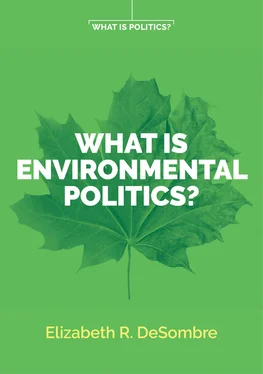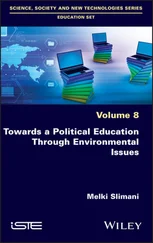For example, climate change is caused, in large part, by the burning of fossil fuels (coal, oil, and natural gas). People who make a living, directly or indirectly, from this industry would likely prefer that we continue to use these fuels; after all, they may find themselves without employment if their industry ceases to operate. Countries with large reserves of fossil fuels would have to give up their right to use what is, for them, essentially free sources of energy, a costly decision for them that might constrain other important priorities they have for providing benefits to their citizens. Those people most affected by existing climate change – people who live in low-lying island states already affected by sea-level rise, for instance – are likely to be strongly in favor of reducing fossil-fuel use. (And since climate change is also caused by land-use changes, fossil-fuel industry actors or those who rely on fossil fuels may prefer that, if changes are to be made, they be made by preventing deforestation or changing agricultural practices rather than by restricting fossil-fuel use.)
But even the rest of us, who are less immediately affected by the issue, likely have a range of preferences and opinions on the topic. Are you afraid that transportation will be more expensive or less accessible if we pass rules to decrease the use of fossil fuels? In the short run, that’s a realistic fear. And, depending on how those rules are implemented, the burden of those decisions might fall on the poorest members of the population who are least able to afford price increases or new technology. When you consider the characteristics of environmental issues, in which the effects of problems are experienced primarily by people not responsible for causing them, and those effects may be felt far away in time and in space, it’s easy to understand why people may not be willing to make their lives harder or more expensive to prevent problems they may not experience any time soon.
The role of science, and scientists (discussed in chapter 2), may be more important to environmental issues than in many other issue areas because of the important role of uncertainty in the creation and resolution of environmental problems. But science and politics interact in complex ways. Even if relevant science is produced and successfully communicated, the political process can turn what appears to be a clear approach into a set of political compromises that undermine the original goal. And science will not save us from having to make political decisions – there is no one right solution to environmental problems, only tradeoffs among options with different advantages and disadvantages for varying groups of people.
What most people focus on when they think about politics are the mechanisms by which these social decisions are made. This is where things such as the forms and processes of governments come in. Do democracies protect the environment better than authoritarian governments do? What effect do different types of governing bodies or the political process of elections have on environmental outcomes? Does the way that laws are created influence the character of rules or the way they are implemented or enforced? These questions are discussed in chapter 3.
Other elements of society also matter in these political decisions. Who are the political actors? Some relevant ones are officially part of the political process. Political parties – how many and of what sort? – can influence what policy options are considered or which ones pass. The bureaucracy is a set of offices and organizations within the government that plays a role in implementing policy; it remains reasonably constant even when elected officials change more regularly. The judicial process – and the courts and judges that comprise it – help decide conflicts among laws or various actors in ways that affect the implementation and enforcement of environmental policy. Non-governmental actors, be they groups of concerned citizens or culpable industry actors, are central players in the politics of addressing environmental issues. Journalism (and, more recently, social media) plays an increasingly important role in channeling information used in political processes. These entities and groups are addressed in chapter 4.
Political decisions become even more complicated when they take place on the international level. In national politics, decisions about environmental policy can compel action from people in that country, whether they support or oppose the policy. But there is no international government that can compel action from countries. Even when these countries get together to create international rules, each country decides, through its own political processes, whether it wants to implement those rules in what might be a global collective action problem. The particular nature of international environmental politics, and its implications for how international rules are created, is discussed in chapter 5.
Finally, chapter 6brings together what we know about environmental issues and political structures to assess which combination of factors makes societies most or least able to deal with which environmental problems. It also addresses unresolved questions about the workings of environmental politics across countries and political levels.
Ultimately, environmental politics is the process by which society’s preferences are created, negotiated, fought about, and translated into a set of policies that influence that society’s use of natural resources or creation of pollution. How these political processes play out is strongly influenced both by the special characteristics of environmental issues and by the nature of the political structures in which this set of social decisions takes place.
1 1. Ronald H. Coase, “The Problem of Social Cost,” Journal of Law and Economics 3 (1960): 1–44, at p. 13.
2 2. Robert Costanza, “Social Traps and Environmental Policy,” BioScience 37/6 (1987): 407–12.
3 3. Julian Simon, The Ultimate Resource (Princeton, NJ: Princeton University Press, 1998).
4 4. Paul Sabin, The Bet: Paul Ehrlich, Julian Simon, and Our Gamble over Earth’s Future (New Haven, CT: Yale University Press, 2013).
5 5. “Oil: High Costs, High Stakes on the North Sea,” Time, 29 September 1975.
Конец ознакомительного фрагмента.
Текст предоставлен ООО «ЛитРес».
Прочитайте эту книгу целиком, на ЛитРес.
Безопасно оплатить книгу можно банковской картой Visa, MasterCard, Maestro, со счета мобильного телефона, с платежного терминала, в салоне МТС или Связной, через PayPal, WebMoney, Яндекс.Деньги, QIWI Кошелек, бонусными картами или другим удобным Вам способом.












